NCERT Solution For Grade 4 EVS Chapter 2 - Ear to Ear
Class 4 EVS Chapter 2 deals with different animals we see around us. It discusses the following concepts Habitats and food habits of different animals, Identification of animals based on their ears, body hair and patterns on their skin, Animals that lay eggs and give birth to young ones. NCERT Class 4 EVS Chapter 2 also explains the causes of the extinction of tigers from India.
Download PDF For NCERT Solutions for EVS Ear to Ear
The NCERT Solution For Grade 4 EVS Chapter 2 - Ear to Ear are tailored to help the students master the concepts that are key to success in their classrooms. The solutions given in the PDF are developed by experts and correlate with the CBSE syllabus of 2023-2024. These solutions provide thorough explanations with a step-by-step approach to solving problems. Students can easily get a hold of the subject and learn the basics with a deeper understanding. Additionally, they can practice better, be confident, and perform well in their examinations with the support of this PDF.
Download PDF
Access Answers to NCERT Solution For Grade 4 EVS Chapter 2 - Ear to Ear
Students can access the NCERT Solution For Grade 4 EVS Chapter 2 - Ear to Ear. Curated by experts according to the CBSE syllabus for 2023–2024, these step-by-step solutions make EVS much easier to understand and learn for the students. These solutions can be used in practice by students to attain skills in solving problems, reinforce important learning objectives, and be well-prepared for tests.
Who has got my ears?
Do you think that the animals whose ears we cannot see, really do not have ears?
No, I do not think so. I think they have ears but they remain hidden.
Are these animals looking funny? The artist has drawn wrong ears on the heads of the animals. Give correct ears to the animals in the space given below.
| Animal | Ear |
|---|---|
| Elephant | Mouse |
| Rabbit | Giraffe |
| Mouse | Dog |
| Giraffe | Elephant |
| Dog | Rabbit |
| Buffalo | Deer |
| Deer | Buffalo |
Different animals have different kinds of ears. Among the animals given below, which one have ears that you can see? In which animal can you not see the ears? Write in the table below.
Deer, Frog , Fish , Ant, Crow, Tiger , Sparrow, Buffalo, Snake, Lizard, Pig , Duck, Giraffe, Elephant ,Cat
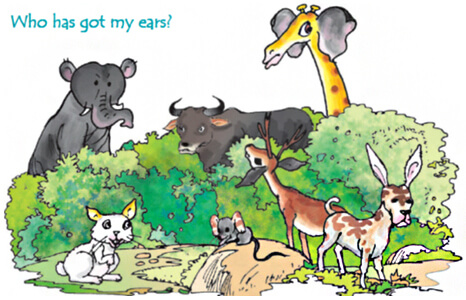
| Animals whose ears we can see | Animals whose ears we cannot see |
|---|---|
| Deer | Frog |
| Tiger | Fish |
| Buffalo | Ant |
| Cat | Crow |
| Pig | Sparrow |
| Giraffe | Snake |
| Elephant | Lizard |
| Duck |
Let us observe this picture
Name the animals in the pictures.

Hen, sparrow, parrot, duck, crow, frog.
Can you see their ears?
No, I cannot see their ears.
Find out some other animals which have ears that we cannot see. Write their names.
Some animals which have ears that we cannot see are—alligator, garden lizard, and snake.
Read and Write
(i) An animal with ears like fans.
(ii) An animal with ears like leaves.
(iii) An animal with ears on the top of its head.
(iv) An animal with ears on both sides of its head.
(i) Elephant.
(ii) Rabbit.
(iii) Guinea pig.
(iv) Dog.
Who’s Skin
Look at this animal. Write its name. Do you know that this is our National Animal?
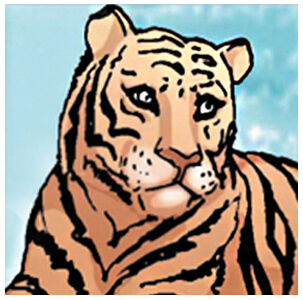
It is a tiger. Yes, I know that the tiger is our National Animal.
Match the animals shown here with the pictures of their skin. Make the correct pattern of the skin on the picture of each animal.
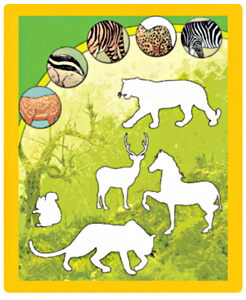
Answer :
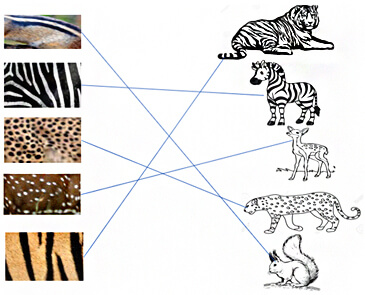
Which animal is it?
My friend Meena has a dog.
Does it have young ones?
No, it has no young ones.
Have you seen animals around your house or school that have small babies? Write their names in your notebook.
Yes, I have seen many animals around my house and school that have small babies.
Their names are —dog, cat, duck, cow.
Where does it live?
It lives in dense forests.
The different patterns on the animals are due to the hair on their skin.
Have you ever seen an animal without hair or whose hair have been removed?
No, I have not seen an animal without hair or whose hair has been removed.
In which list did you put the cow and the buffalo? From a distance, can you see the hair on their skin? Try to go near one of them. Could you see the hair?
I have put the cow and the buffalo in the list named ‘has hair on its skin’.
Well, from a distance, it is a little bit difficult to see the hair on their skin. If we go near them, we can definitely see the hair.
If you were to meet an elephant, would you dare to touch it?
No, if I ever meet an elephant, I would never dare to touch it.
Have you ever kept a pet? Does anyone you know keep a pet?
No, I have never kept a pet.
But, my friend Meena has a dog at her home. Another friend named Shivesh had a cat, but she is no more.
Does it have a name? What is it?
Well, it has a name. Meena calls it Rimo.
Who gave it this name?
Rimo was named after Meena’s cousin brother’s wish. In fact, Rimo was brought to Meena’s home by him.
What does it like to eat?
Rimo is an omnivore, and he eats everything. Meena says his favourite food is boiled chicken and rice.
How many times a day is it given food?
Rimo is given food at least 3 to 4 times a day.
When does it sleep? For how long does it sleep?
Rimo sleeps at night, and he sleeps for a maximum 7 to 8 hours a day.
Is there any special way to look after this animal? How?
Yes, certain things are done to take care of Rimo. Apart from providing it food, cleaning it and taking it for walks, Meena’s father also takes Rimo to a local dog salon once a month for special cleaning and clipping its nails. Rimo is also taken to the veterinary clinic for regular check-ups and vaccination
Does it get angry? When? How do you know it is angry?
Yes, it gets angry.
Rimo gets fussy when someone touches its tail. Otherwise, he is very friendly and playful.
When it gets angry, his ears become erect. It starts barking aggressively and growls at others.
Does it have hair or feathers on its skin?
Yes, it has hair on its skin which is pale brown.
Can you see its ears?
Of course, I can see its ears.
Is it a baby or a young animal or a full-grown animal?
It is not a baby; rather it is a young animal. Meena’s brother brought it a few months back when it was three months old.
Will this pet animal lay eggs or give birth to babies?
This pet animal would not lay eggs; it would give birth to babies.
Draw a picture of this animal and colour it. Give it a name of your own choice
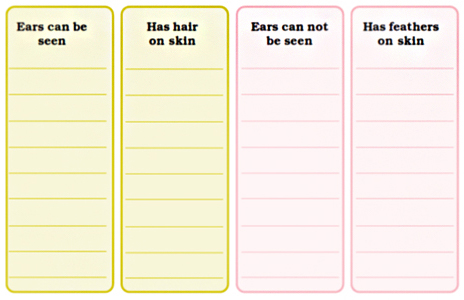
If I had a pet dog, its name would be Coco.
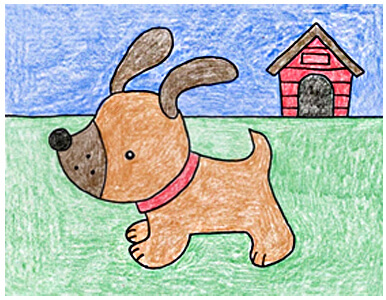
Have you seen any animal that looks a little like dinosaur? Do you know its name?
Yes, I have seen an animal that looks a little like a dinosaur. Its name is house lizard.
The numbers of this animal are going down in India. Discuss why this could be happening?
Due to the rapid felling of trees, tigers are losing their homes. The construction of highways and railway tracks are also destroying the forests in which the tigers live. As a result, they are getting close to human settlements, which is putting their life at risk. Also, the hunting of tigers in India has led to a decrease in the tiger population. These are the reasons for which the numbers of tigers are going down in India.
Now, look again at the table on the previous page. Draw a line under the names of animals whose names are in the green box. Put a circle around the names of those animals whose names are in the red box.
Answer :
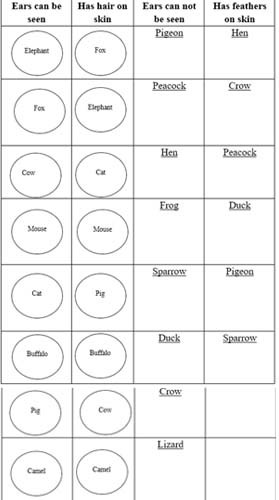
Look at this picture. Colour the parts which have even numbers (2, 4, 6, 8…). What do you see? Find out the name of the animal.
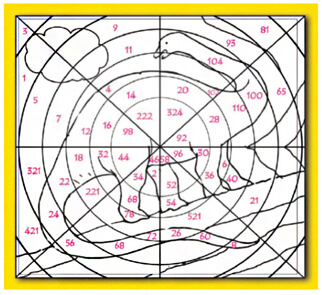
If I colour the parts with even numbers like (2, 4, 6, 8) ….
I can see an animal, and it is a dinosaur.
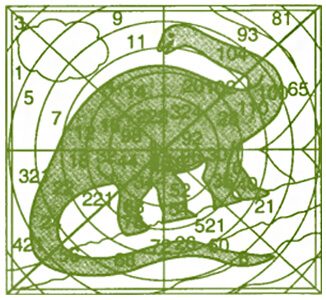
You might have seen some of the animals given below. Fox, Elephant, Sparrow, Pigeon, Frog, Crow, Peacock, Pig, Mouse, Cat, Buffalo, Duck, Hen, Camel, Lizard, Cow
Put the names of the animals in the table below.

| Ears can be seen | Has hair on skin | Ears can not be seen | Has feathers on skin |
|---|---|---|---|
| Elephant | Fox | Pigeon | Hen |
| Fox | Elephant | Peacock | Crow |
| Cow | Cat | Hen | Peacock |
| Mouse | Mouse | Frog | Duck |
| Cat | Pig | Sparrow | Pigeon |
| Buffalo | Buffalo | Duck | Sparrow |
| Pig | Cow | Crow | |
| Camel | Camel | Lizard |
Can you tell which of the animals mentioned in the list lay eggs? Find out and write the names of these animals in the green box. Which of the animals in the list give birth to babies? Write their names in the red box.

Animals which gives birth to babies
a) Fox
b) Elephant
c) Cat
d) Mouse
e) Pig
f) Buffalo
g) Cow
Animals which lay eggs
a) Hen
b) Crow
c) Peacock
d) Duck
e) Frogs
f) Sparrow
g) Pigeon
h) Lizard
Admissions Open for 2025-26
Frequently Asked Questions
The NCERT solution for Class 4 Chapter 2: Ear to Ear is important as it provides a structured approach to learning, ensuring that students develop a strong understanding of foundational concepts early in their academic journey. By mastering these basics, students can build confidence and readiness for tackling more difficult concepts in their further education.
Yes, the NCERT solution for Class 4 Chapter 2: Ear to Ear is quite useful for students in preparing for their exams. The solutions are simple, clear, and concise allowing students to understand them better. They can solve the practice questions and exercises that allow them to get exam-ready in no time.
You can get all the NCERT solutions for Class 4 EVS Chapter 2 from the official website of the Orchids International School. These solutions are tailored by subject matter experts and are very easy to understand.
Yes, students must practice all the questions provided in the NCERT solution for Class 4 EVS Chapter 2: Ear to Ear as it will help them gain a comprehensive understanding of the concept, identify their weak areas, and strengthen their preparation.
Students can utilize the NCERT solution for Class 4 EVS Chapter 2 effectively by practicing the solutions regularly. Solve the exercises and practice questions given in the solution.

